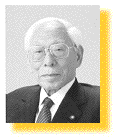- MATSUMAE SHIGEYOSHI: SELECTED QUOTES -". . .when I encounter people who believe in social justice, [who] do not flinch when faced with a strong opponent and are not disheartened by difficulties, I am always invigorated, even if their ideology is different from mine." - 1986: 37
"There is nothing so fragile as an excess of self-confidence." -1986: 215
". . . my motto throughout my life has always been 'enthusiasm, effort, and ingenuity.'" -1986: 227
". . . the democratization of Japan is possible only by demolishing the old culture and sewing the seeds of a new culture on the charred foundations." - 1987: 3
"The foundation of true democracy is national culture consisting of . . .
qualitative enhancement of each of the members of the state. Simply
to legalize a system of rights and to produce a political system which
has the trappings of democracy and to say this is true democracy is to
construct an edifice on a foundation of sand." - 1987: 69
"A country with no weapons is country that is truly armed. A country
without armor and protection is a country with true armor and protection. These are the truths that the Bible shows us."
- 1987: 75
"A striking tendency throughout Japanese history has been to place a higher value on the discretion of age than on the skills of the young. . ."
- 1987: 126
"Ironically, history will quickly bury those politicians who live for
themselves alone, but those who resist authority and are miserably
defeated, if they live their lives as faithful servants of the truth,
will be immortalized." - 1987: 56
"Those who arm themselves thinking only of their own defense do not show true bravery. True bravery is found in the person who shows love and justice and is prepared to abandon himself and has a spirit of self-sacrifice." - 1987: 97
"History is full of many examples of how once something is systematized, however many faults it throws up, it will not be reformed
or revised." - 1988: 126
"There is a strong tendency in Japan for political, economic, and cultural influence to b centralized and for regions to be put in second place."
- 1988: 198 "If I were to define my personal ideology, I would say I was a Christian Socialist and that my ideas were close to those of Robert Owen." - 1988: 242-243 |
